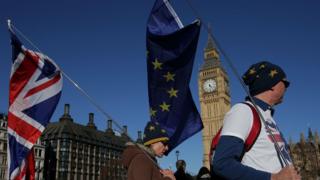
MPs have warned about the UK and the EU failing to reach a Brexit agreement, urging the government to work out how much “no deal” would cost.
The Brexit committee said ministers’ claim that “no deal is better than a bad deal” was “unsubstantiated” until an economic assessment was published.
But the report divided the cross-party committee, with some members saying it was too pessimistic about Brexit.
The government said it was “preparing for all potential outcomes”.
- Brexit: All you need to know
- Key points from the Article 50 letter
Prime Minister Theresa May has formally triggered Brexit using Article 50 of the Lisbon Treaty, with the UK due to leave in March 2019.
The Brexit committee’s report assesses the government’s objectives for the negotiations that are to come over the next two years, as set out in a white paperin February.
‘Informed position’
A total of 12 principles were set out, including migration control and “taking control of our own laws”.
The report said it was important to avoid no deal being reached, saying: “The government has talked about walking away from a bad deal, but has not yet explained what terms would be demonstrably worse for the UK than ‘no deal’.”
It called for a “thorough assessment of the economic, legal and other implications” to be published, adding: “Without an economic assessment of ‘no deal’ having been done and without evidence that steps are being taken to mitigate what would be the damaging effect of such an outcome, the government’s assertion that ‘no deal is better than a bad deal’ is unsubstantiated.”

The MPs said it said it was “essential” for Parliament to get a vote on whether to proceed if no deal was reached.
Labour MP Hilary Benn, who chairs the committee, said the government was right to push for both negotiations on a new trade deal and separation talks to take place at the same time.
But he said ministers had to be prepared for “the worst case”, given the “particularly tight” timescale.
‘Skewed and partisan’
The committee said it was possible that the current “convergence” between the UK and EU would mean talks could move more quickly than previous negotiations, but added: “It is not yet evident, however, that the two-year timetable for achieving this is realistic.”
The report looks at different aspects of the EU talks, saying the status of EU nationals “cannot be left unresolved” until the end of talks and warning new migration controls should not damage the economy.
It also says the government has to recognise “differences in the negotiating priorities of the different parts of the UK”.
Some MPs walked out of a private meeting of the committee as the report was being finalised, saying it was too “gloomy”, and six MPs voted against it, with 10 backing its publication.
Five Conservatives – including former ministers John Whittingdale and Dominic Raab – and Democratic Unionist Sammy Wilson voted against the report, but were outnumbered by 10 Labour, Tory, Liberal Democrat, SNP and SDLP committee members, all of whom backed Remain in last year’s referendum.
Mr Whittingdale said he thought the report was “unduly negative” and had “very much concentrated on the problems without really recognising the opportunities” of Brexit, and Mr Raab added: “The report was rushed, skewed and partisan. After two reports that had strong support, it’s regrettable that this one split the committee.
“That undermines its credibility and influence, but I hope and expect the committee will learn the right lessons as we move forward.”
But Lib Dem committee member Alistair Carmichael said the report was “a devastating critique of the shambles that is the Conservative Brexit strategy”.
Brexit Secretary David Davis said: “We are confident that such an outcome is in the interests of both sides. However, a responsible government should prepare for all potential outcomes, including the unlikely scenario in which no mutually satisfactory agreement can be reached, and that is exactly what we are doing.
“We have also been analysing the impact of different scenarios on different sectors of the economy.
“We are clear that no deal is not what we want or expect, but that it would be better than a deal which sought to punish the UK.”
[“Source-bbc”] Techosta Where Tech Starts From
Techosta Where Tech Starts From